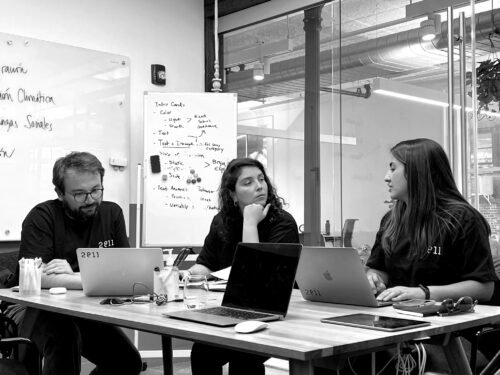
Social innovation is one of the flags of the work of 2811. We understand it as a novel approach that seeks to solve social and environmental problems in a sustainable manner, involving theto society and the economy in the process. From this perspective, education is key to being able to promote it in different social spheres. This is where universities and their possible spaces for cooperation come in.
Universities are a crucial part of training of future leaders, entrepreneurs and critical citizens who, from an ethical perspective, will face the great social, economic and environmental challenges facing the planet today. Therefore, they are institutions that have an important role in the promotion of social innovation from academic spaces.
One of the ways they can do this is through collaborative spaces between them. Knowledge should seek to be inclusive, collaborative and diverse : its formulation must aim at co-creation instead of exclusion.
This is the aim of the Third University Meeting of Agents of Change , to be held on April 25, 26, and 27 at the Tecnológico de Monterrey in Guadalajara in Mexico. This is a unique opportunity for actors from the university ecosystem to meet and discuss how we can create and imagine higher education for change, with social innovation.
Change the focus to train agents of change
This event seeks to inspire paradigm changes in higher education in Latin America , and is aimed at professors, teachers, social entrepreneurial leaders, promoters in higher education institutions and people interested in training change agents .
The event will address innovation from research and common spaces in classrooms. Experiences of learning systematization, institutionalization of initiatives, systemic thinking and good practices will be discussed. These topics are essential for universities to be able to fulfill their role of training students capable of facing the challenges of the 21st century.
In addition, the talks will address issues of systemic change, interculturality and impact measurement. This is important because social innovation must be approached comprehensively, taking into account the cultural and social particularities of each region. Likewise, it is important to measure the impact of social innovation initiatives in order to improve and expand them.
Why collaboration between universities?
First of all, collaborative spaces such as this event allow the connection between actors in the social innovation ecosystem, such as students, teachers, entrepreneurs, companies and social organizations. These actors can collaborate on projects and activities to share knowledge, resources and skills . This is how effective and lasting solutions can be created .
Second, they encourage creativity and experimentation. By bringing together different stakeholders with different perspectives, new ideas and innovative solutions can be generated. The Students can experiment with projects, learn from mistakes, formulate new ideas, and improve their skills.
For their part, teachers they can support students in their projects, expand the knowledge base and share their experience. The Entrepreneurs and companies can offer financing, mentoring on the best path to follow and access to contacts.
Third, these instances of collaboration can serve as incubators for innovative projects.. They can offer tangible and intangible resources to accelerate projects, provide training and provide spaces. In this way, the development of projects that have a positive social impact .
Fourth, collaborative spaces can contribute to the growth of the social innovation ecosystem.. By bringing together different actors, contact and collaboration networks can be created, strengthening the ecosystem and offering new opportunities. In addition, the projects developed in these spaces can serve as models for other projects in the future.
Universities undoubtedly play a role in promoting social innovation, and offering collaborative spaces is an effective way to create connections between different actors, foster creativity and experimentation, and serve as incubators. In this way, these instances can be used to promote social innovation and promote sustainable solutions to the needs of the planet.
Do you want to be part of a great space for collaboration between universities? Dare to participate in this meeting, enter and register here .
Related Posts
Skills for resilience: coping with a new 21st century
Education is key to boosting innovation. This is where universities and their possible common spaces come in.
Read moreEducation and technology: a powerful mix for planetary regeneration
If climate change is a major planetary event, how do you better educate the next generation of change agents?
Read moreIn this way, social innovation can produce impact projects
Innovation can give us unprecedented proposals and impact projects; also open ourselves to new perspectives and horizons.
Read more


